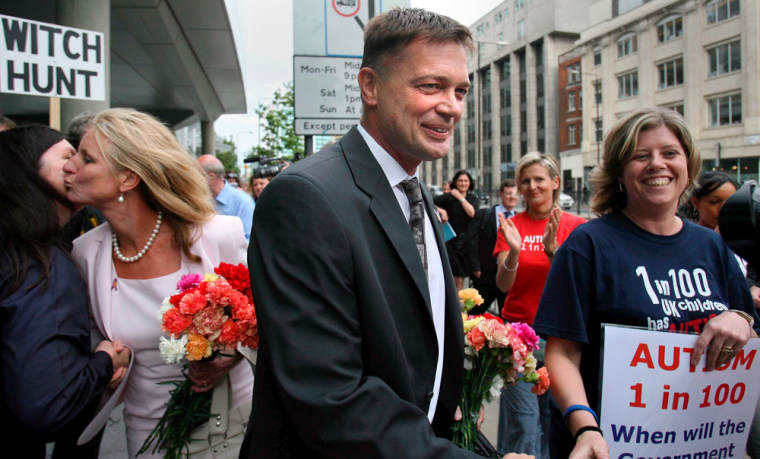The doctor behind a controversial study linking a common children's vaccine to autism went before an investigative panel Monday probing misconduct allegations, including whether he took blood samples from children at a birthday party.
Britain's General Medical Council is examining claims that Dr. Andrew Wakefield failed to disclose his links to autism litigators and conducted the study without proper ethical approval. Wakefield denies any misconduct.
Wakefield's study suggested that the combined measles-mumps-rubella (MMR) vaccine, which is administered throughout the world, could put children at risk of autism or bowel disease. The finding published in The Lancet medical journal in 1998, and the subsequent media coverage, led many parents to refuse to vaccinate their children.
But the study was soon discredited, and 10 of its 13 authors have since renounced its conclusions. The Lancet also said it should not have published the study, saying Wakefield's links to litigation against the manufacturers of the MMR vaccine were a "fatal conflict of interest."
In addition to Wakefield, two other authors of the paper — John Walker-Smith and Simon Murch — are being investigated by the medical council.
Numerous studies have concluded that there is no link between the MMR vaccine and autism or bowel disease. Wakefield suggested that vaccines be administered separately. The vast majority of the medical establishment supports the combined vaccine's use.
"It is one of the safest, best-studied vaccines," said Dr. Philip Minor, head of virology at Britain's National Institutes of Biological Standards and Control. Doctors warn that the MMR controversy has led many parents to underestimate the dangers of the diseases. Last April, for the first time in more than a decade, a 13-year-old boy died from measles in Britain.
Wakefield stands accused of conducting operations on children — including colonoscopies and lumbar punctures — which were arguably unnecessary, of coordinating his research with lawyers for autism patients, and of taking blood from a group of children at his son's birthday party — paying them 5 pounds each for their contributions and later joking about the incident.
The council said Wakefield could be barred from practicing in Britain if the allegations are proven. The hearings are expected to last through October.
The number of measles cases surged as the proportion of vaccinated children in Britain fell below 80 percent, leading researchers to warn that the disease — once all but wiped out —could become endemic in Britain.
Mounting concern over the disease even prompted the intervention by then Prime Minister Tony Blair, who lead a campaign to reassure concerned parents. Vaccination rates have since rebounded, but not to a level sufficient to protect the entire population from the diseases.
Before Monday's hearing, parents gathered to show their support for Wakefield, holding signs, clapping and cheering as he walked in.
The doctor and his wife posed for pictures while a few parents chanted: "There's only one Andrew Wakefield," One shouted: "It's a witch hunt."
